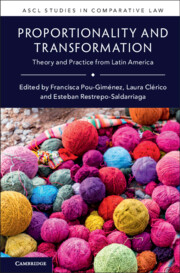Book contents
- Proportionality and Transformation
- Ascl Studies in Comparative Law
- Proportionality and Transformation
- Copyright page
- Contents
- Editors
- Contributors
- Acknowledgments
- Introduction
- Part I Proportionality and Processes of Constitutionalization
- 1 The Standard Reasonableness Test and Proportionality in Argentina
- 2 Proportionality in the Case Law of the Constitutional Court of Ecuador
- 3 Proportionality and Human Rights in Mexico
- 4 Proportionality and the Construction of Democracy
- 5 Proportionality in the Case Law of the Chilean Constitutional Court
- Part II Proportionality in Social Rights and Equality-Based Adjudication
- Part III Proportionality, between Transformation and the Status Quo
- Index
3 - Proportionality and Human Rights in Mexico
from Part I - Proportionality and Processes of Constitutionalization
Published online by Cambridge University Press: 27 October 2022
- Proportionality and Transformation
- Ascl Studies in Comparative Law
- Proportionality and Transformation
- Copyright page
- Contents
- Editors
- Contributors
- Acknowledgments
- Introduction
- Part I Proportionality and Processes of Constitutionalization
- 1 The Standard Reasonableness Test and Proportionality in Argentina
- 2 Proportionality in the Case Law of the Constitutional Court of Ecuador
- 3 Proportionality and Human Rights in Mexico
- 4 Proportionality and the Construction of Democracy
- 5 Proportionality in the Case Law of the Chilean Constitutional Court
- Part II Proportionality in Social Rights and Equality-Based Adjudication
- Part III Proportionality, between Transformation and the Status Quo
- Index
Summary
This chapter presents an overview of the use of proportionality in the case law of the Mexican Supreme Court, which has used it mainly to analyze human rights restrictions established by the legislator in statutes. The study identifies two periods. In the first period, the Court begins to use proportionality to analyze the constitutionality of legislative classifications that allegedly violated the right to equality, under a syncretic methodology that is applied not always consistently. More recently, the test has been used more often and regarding rights of very different types, providing a crucial support to the enforcement of the 2011 human rights’ constitutional amendments. The chapter documents the reception of proportionality in terms of both substance and methodology but also offers insight on the main difficulties experienced along the process and on the challenges its use in the Mexican judiciary poses for the future.
Keywords
- Type
- Chapter
- Information
- Proportionality and TransformationTheory and Practice from Latin America, pp. 63 - 87Publisher: Cambridge University PressPrint publication year: 2022

